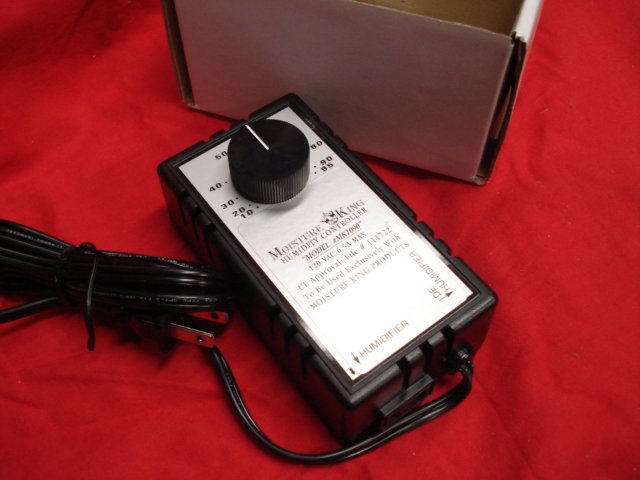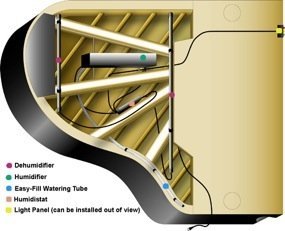Having said all this the best thing for a piano is stable humidity all year long. Ideally humidity should be about 45% Unless your home has climate control and central humidity control it is advisable to protect your piano by getting some form of humidity control.
Depending on where you live you may need dehumidification or humidification or both. Some places only need dehumidification. If this is the case, there are some very inexpensive ways you can address this problem.
Manufacturers make a dehumidification bar. This is good for dehumidification only. These devices can also destroy a piano if for some reason they are left on when the humidity drops for some reason. I have seen pianos destroyed when people keep these plugged in all winter long. When the heat comes on the humidity drops and then the De-humidification bar causes the humidity to drop even further. I recommend to clients that they also purchase a humidity control unit that turns off the dehumidifier when the humidity gets below a certain point. The unit then feeds a humidifier if one is plugged in. A cheap humidifier can be purchased at Walmart for this purpose. Walmart does not sell the heater bar or the humidistat unit. Here is a picture of this Humidity Control Unit:

The dehumidification bars come in two sizes, 36" and 48" The best place to install these is on the bottom kick plate on an upright piano. The clips come with the heater bar to install on the back of the kick plate. Or the bar can be hung inside the piano.
On a grand piano it is best to install a 36" bar and a 48’ bar. These should be placed on the tail of the Grand piano, and under the front of the piano. Again the units should be unplugged during the heating season or purchase a humidity control unit to automatically turn off the dehumidification bar if the humidity drops too low.
We also recommend getting a 3 part system with smart bar if you want an all in one solution. The smart bar automatically turns the heater bar in the humidification tank off if it senses there is no water in the humidification tank. This is a safety factor because if the heater bar (which is used to dissipate water) did not turn off, instead of humidifying your piano it would dehumidify and could damage your piano. This system is made by Damp Chaser and we can install it to local piano clients however it is not available to purchase on line. We are able to install this system if you live in the Northeastern PA regions. We are located in the Scranton Pa area. If you want to purchase this system outside of our territory you will have to contact a local technician because no one sells this unit on line. This system is often referred to as the piano life saver system. As long as you keep it plugged in and feed the humidifier water the unit should maintain a constant 45% humidity factor for your piano. Click on the image below for more information.

IV. SOME FINAL THOUGHTS ABOUT A PIANOS ENVIRONMENT
I often have people ask me about placing their piano on an outside wall. Usually in the old days when houses were not insulated very well it probably was best not to put a piano on an outside wall. In those old farm houses you could feel the breeze blowing right through the wall. Cold air hitting hot air could cause condensation and damage to the piano especially as steel strings will tend to rust. However, newer building codes and insulation standards have just about eliminated this problem. Also as far as heating systems go, the worse heating systems for a piano are convection style wood or coal burners, forced hot air, or electric heaters. Better systems are steam and hot water baseboard. The best heat I have seen for pianos believe or not are propane gas fireplaces or space heaters. Propane emits water into the air as it heats. I tuned one piano that had not been tuned for many years and found the instrument to be within a few cents of 440. I was amazed. But the client heated the room entirely all winter with a propane wall heater. I was impressed.
For pianos that are put up against radiators, hot water or electric I recommend that a reflective style insulation board should be cut and placed on the back of the soundboard to reflect the dangerously dry heat from doing damage to the soundboard of the piano. The boards need not be thick. The idea is to reflect the direct heat rays back away from the piano and avoid the heater from drying out the wood and doing damage to the pianos back and drying out the soundboard and ribs.
How about a window? The biggest problem with windows is that someone may leave it open and a storm may come and rain may pound on the piano. Also an open window can let in a lot of humidity. The greatest concern about putting a piano near a window is that strong rays from the sun can cause cosmetic damage to your piano. I have had many a grand piano where the top of the lid is a different shade than the underside, Also closing over the lid would expose the two shades of the piano. A darker environment will always preserve wood finishes better.
V. MY ADVICE FROM MY EXPERIENCES
A few years back I was restoring a vintage piano. The soundboard was original and immaculate Not a crack. We ran out of time to continue the project and the busy Christmas season was upon us. So, I covered over the piano in blankets and decided in the spring I would restring it. When spring came I took the blankets off and was shocked to see cracks throughout the soundboard. What was a immaculate perfect soundboard was now a mess. We proceeded to rebuild the soundboard but also I invested in a whole shop humidifier. Never before had I seen in a short time what low humidity can do to devastate a piano. I personally believe that the worst enemy of a piano is extreme low humidity. When loggers want to preserve their logs they will totally submerge them in a pond or lake. Such logs can be stored for over 100 years. It is also said that such logs make better musical instruments. So it is my contention that low humidity is more dangerous for a piano than high humidity. The biggest danger I have seen with high humidity is the piano going sharp.. This problem can be solved if you just have it tuned often. The other problem is rusty strings. I have only seen this problem in extremely high humidity regions. Also sticky keys can be a problem. However, this nuisance usually only happens because the client does not have a tech over enough to de-ez the keys and apply proper lubrication. Except for rusty strings I do not see as severe damage with high humidity as low. It is for this reason I really advise people to use a humidistat controller with dehumidification bars whenever possible. Either this or again make sure the bar is unplugged in the winter. After all in trying to solve one problem you can cause other more severe problems if you are not careful.
VII. A PIANO DISCLAIMER
Through the years I have seen clients complain about small pianos they have purchased. I think they expect the piano to sound as good 6 months down the road as it did the day it was tuned. You should expect that a small piano will go out of tune in 6 months. I had one lady complain because she bought a small spinet and had it in an old coal miners house. Poor insulation, hot air heat, and she said the piano is defective because it will not stay in tune for a year. I don’don't think a 60,000 Sternway would stay in tune for more than a year in her house. For such people I tell them get a digital. If you can’can't afford to get your piano tuned each time it goes out of tune get a digital piano. People often say a digital is not a good.. I would say no it is better if it is always in tune.. Years ago I started out as an organist, my hammond organ was always in tune. When I was 15 years old I told my music teacher in high school, that I wanted to go to college as a music major. He said what instrument do you want to major in, I said, Hammond organ.. he said you need to learn piano. So at age 15 I got a piano. It was a spinet… and sure enough I had to have it tuned just about every 6 months because I knew what an in tune instrument should sound like from playing a fixed key instrument like a Hammond organ. Birds fly, cows moo, cats meow, and pianos go out of tune…
I had a beautiful Mason Hamlin Grand piano that was on consignment a few years back. It was one of the most delightful pianos I have ever played. However, before I got the whole shop humidification unit in my shop it needed to be tuned every three months. I loved using it for recordings, however, each time I recorded with it .. it needed to be tuned. I usually always try to encourage my clients to ad a lifesaver system to their piano when they purchase a piano from me. The reason why is simply because I know that environmental humidity changes are one of the greatest factors to tuning stability and preservation of a fine piano.
These observations concerning hostile environments for acoustic pianos. I have had over 36 years experience in tuning repairing buying and selling pianos. Over these many years I have found that a pianos environment is one of the key factors to tuning stability, and longevity of the instrument. I hope this article has been of help to you to understand this issue and some ways to solve humidity problems and environmental problems with your piano.
Thank you for reading this article and feel free to email me if you have any questions or further concerns about this matter. You can find all the items mentioned in this article for sale at our on line web store, at www.pianofarm,com.